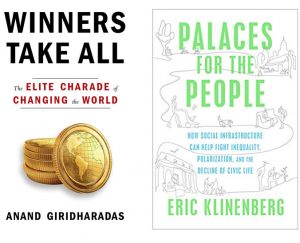 This month’s list of the best books I’ve read over the last 30 days that were published this year is among the most diverse.
This month’s list of the best books I’ve read over the last 30 days that were published this year is among the most diverse.
- (5.0) Palaces for the People: How Social Infrastructure Can Help Fight Inequality, Polarization, and the Decline of Civic Life by Eric Klinenberg (Crown, 2018)
- (4.5) Winners Take All: The Elite Charade of Changing the World by Anand Giridharadas (Knopf, 2018)
- (4.5) Healing Our Broken Humanity: Practices for Revitalizing the Church and Renewing the World by Grace Ji-Sun Kim and Graham Hill (IVP, 2018)
- (4.0) Humble Leadership:The Power of Relationships, Openness, and Trust by Edgar H. Schein and Peter A. Schein (Berrett-Koehler Publishers, 2018)
- (4.0) Didn’t See It Coming: Overcoming the Seven Greatest Challenges That No One Expects and Everyone Experiences by Carey Nieuwhof (WaterBrook, 2018)
- (4.0) No Fail Meetings: 5 Steps to Orchestrate Productive Meetings (And Avoid All the Rest) by Michael Hyatt (Michael Hyatt & Company, 2018)
- (3.5) A New Republic of the Heart: An Ethos for Revolutionaries–A Guide to Inner Work for Holistic Change by Terry Patten (North Atlantic Books, 2018)
- (3.0) Giving Up Sunday: Looking for More from Faith, Community, and Calling by Kurtis Vanderpool (Amazon, 2018)
So What?
There are so many ways we might change our world for the better. This month’s top two books offer remarkable insight for those inclined to be world changers.
Eric Klinenberg is a sociologist who teaches at New York University and has been mentioned on this blog in the past. His earlier book – Going Solo: The Extraordinary Rise and Surprising Appeal of Living Alone – was one of my top 10 books of 2012. Klinenberg’s latest book – Palaces for the People: How Social Infrastructure Can Help Fight Inequality, Polarization, and the Decline of Civic Life – addresses the design of future communities that promote human flourishing for all people. Building on his earlier work, Klinenberg proposes that human connections are key. Third spaces that are truly open to all are essential to overcoming isolation. Current examples include public libraries, parks, and pools; childcare centers; bookstores; and churches and synagogues. Humans need one another. This book pushes readers to consider better ways to create environments that enable such connections for all people.
Anand Giridharadas is a former McKinsey & Company consultant turned journalist. He is the author of three books, and is a former New York Times columnist. Giridharadas’ Winners Take All: The Elite Charade of Changing the World challenges the dominant view that the wealthy who engage in philanthropy are lessening inequality. Instead, he proposes that their actions sustain it. Doing some good is better than not acting, but ultimately not good enough. Real progress is only likely to occur when several of the largest funders adopt new thinking about how their monies can be spent. Ultimately, these elites must recognize their own contributions to inhibiting human flourishing, and, with humility, embrace new thinking that would allow for a world in which so many people would not always be in need of their help.